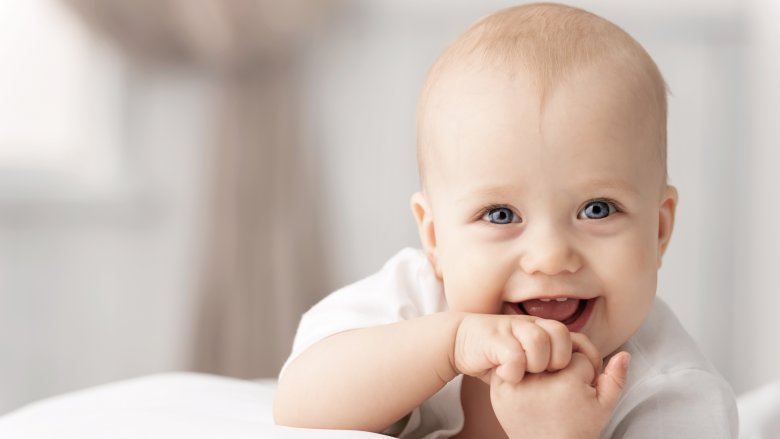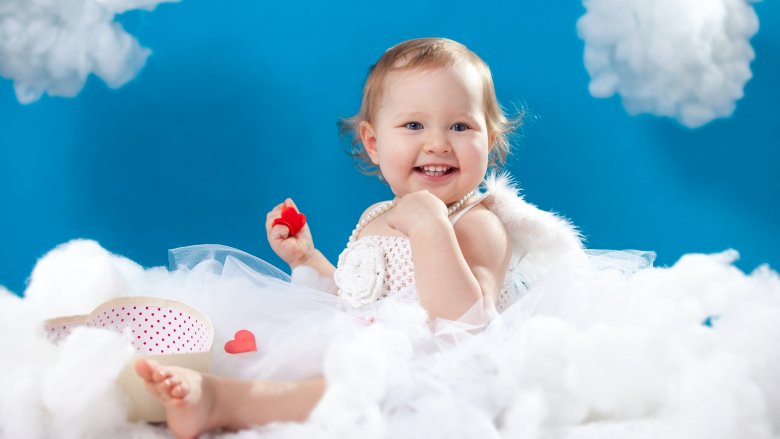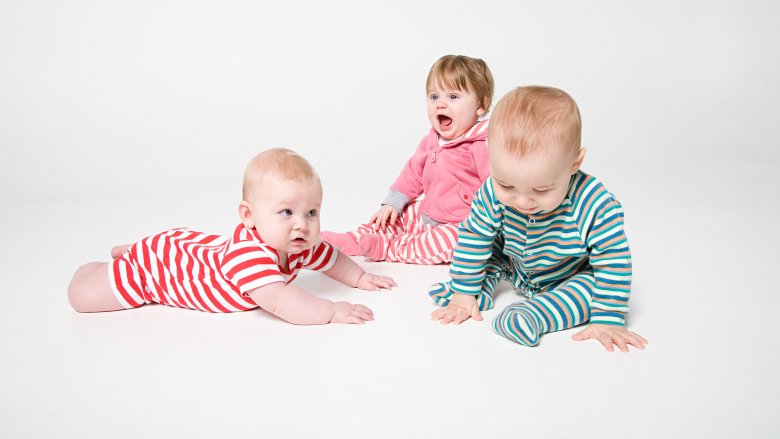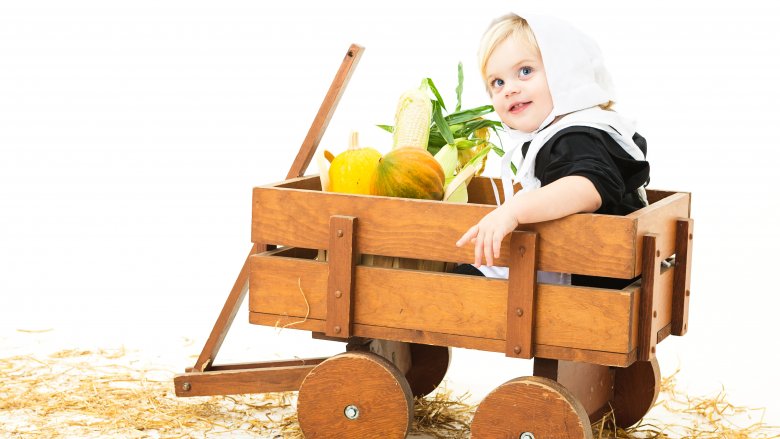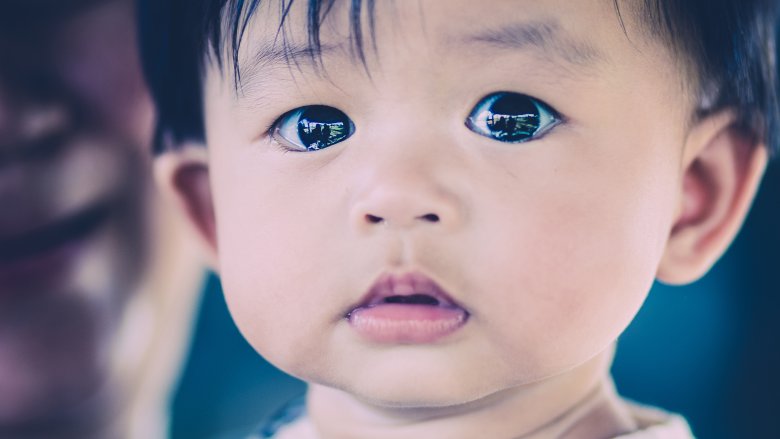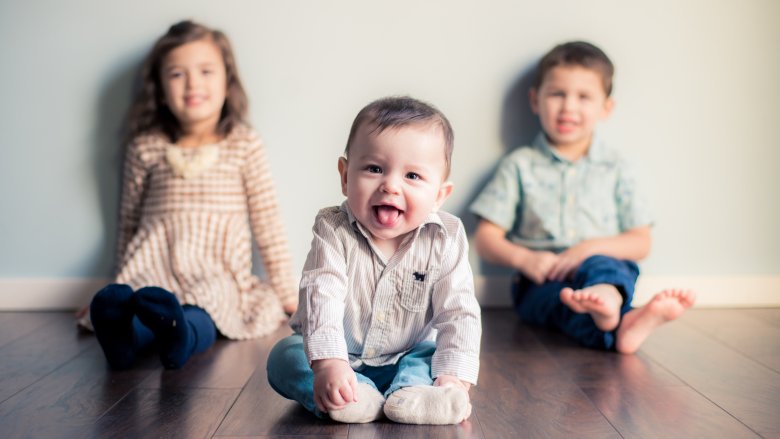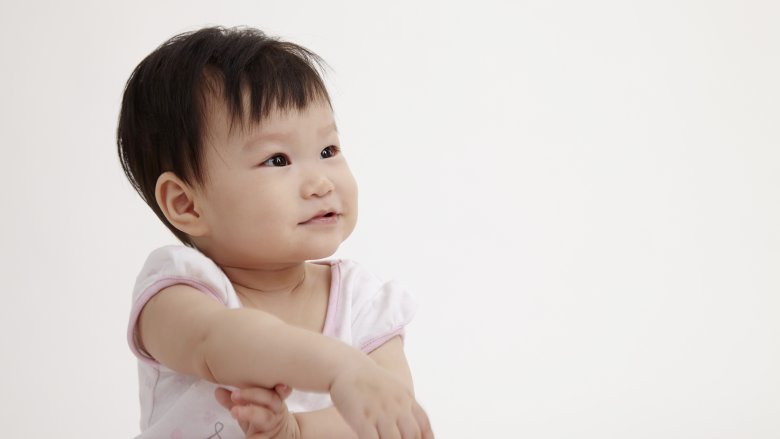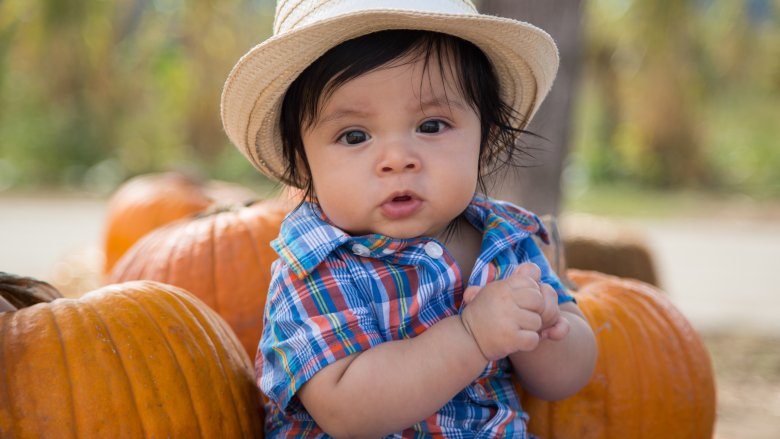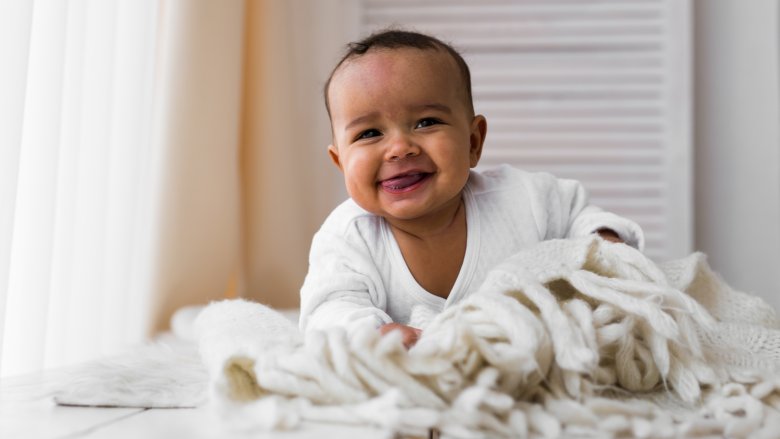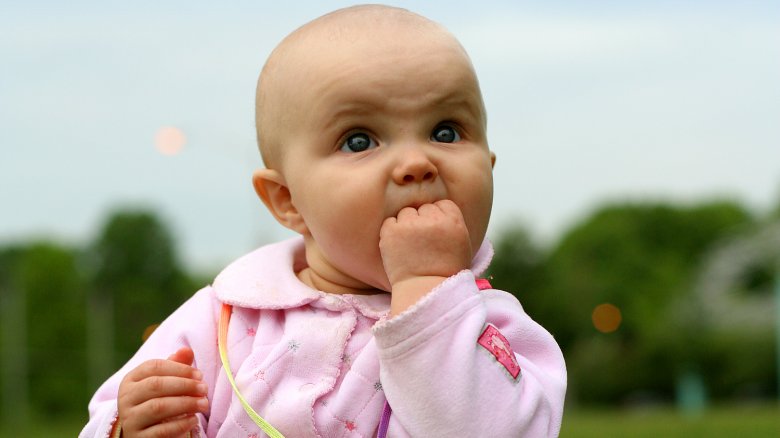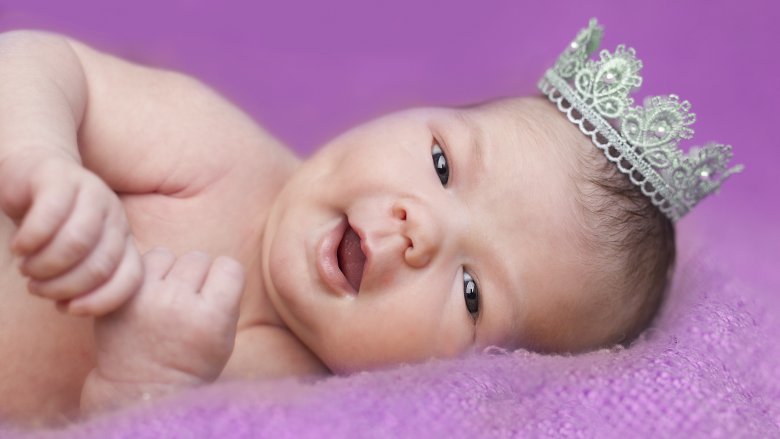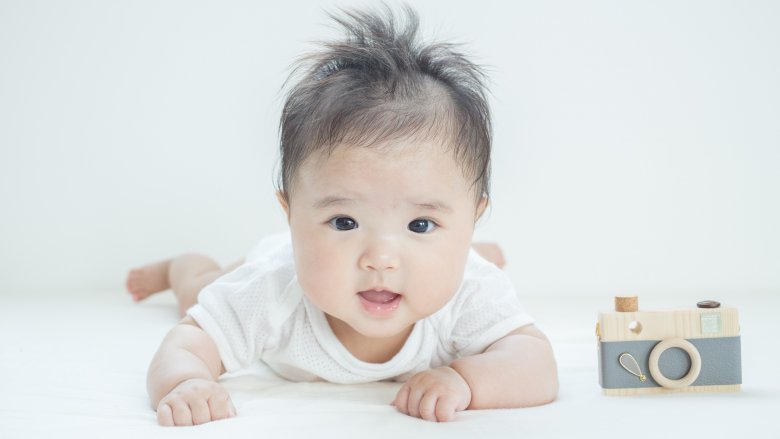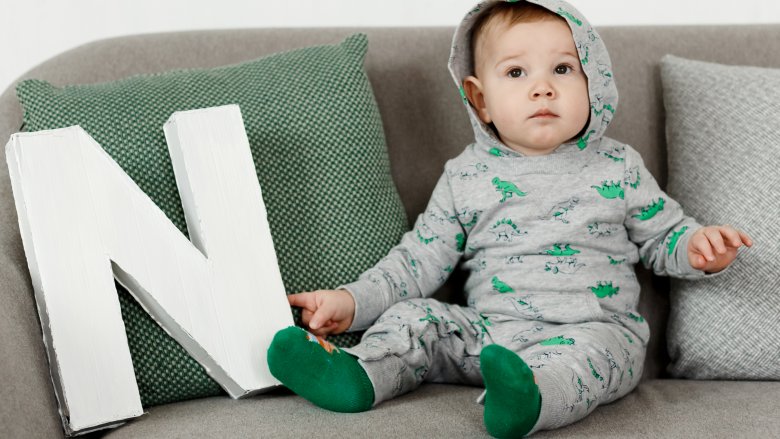The Weirdest Baby Name Trends In History
We may receive a commission on purchases made from links.
There is no doubt that unusual baby names are becoming more and more fashionable. While it might seem like bestowing a unique name on your baby to pay homage to something in pop culture (think Chardonnay or Katniss) is a modern phenomenon, today's parents don't have a monopoly on weird name trends. There have actually been a surprising number of strange baby name trends throughout history.
In some cases, parents tried so hard to keep things traditional that too many people ended up with the same name. In others, parents tried so hard to go to the other extreme with unique names that they saddled their kids with monikers even worse than Apple. After hearing about some of these name trends, you might think that celebrity baby names aren't so bad after all. From the Middle Ages to the modern era, here are some of the weirdest and wackiest baby name trends throughout history.
Only the holiest of names
In the Middle Ages, the names of saints were very popular for English babies. Unfortunately, this didn't leave many names to choose from since there simply weren't that many saint names to choose from. Adding to the chaos was that there were far more male saints than female saints (thanks, patriarchy) so parents would often give their baby girls names that are typically masculine. It's hard to imagine, but there were a surprising number of little girls named Richard in this time period.
The practice of naming babies after saints helped to give rise to many new feminine names. Since the Church recorded baptismal names in Latin, girls with male names automatically had a feminine Latin ending added to them. Philip would be written as Philippa, Alexander would be written as Alexandra, and so on. It would take some time for these to become the standard feminine versions of the names, but something must have clicked since they are still in use today.
Fishing in a tiny pool of names
Things hadn't improved too much by Elizabethan times. While parents weren't necessarily naming their children after saints, they did tend to choose names from a very small pool. Most parents stuck to the same 30 or 40 names. They did branch out on occasion, but parents who named their children out of the most common names were still typically choosing from only an additional hundred or so names.
Even more surprising is how many of the most popular names of the time are still in wide use today. Scott Smith-Bannister studied the most popular names of the era (and beyond) in Names and Naming Patterns in England, 1538-1700. Names like John, Thomas, William, and Richard were popular in Elizabethan times and have endured as popular male names for centuries, just as names like Elizabeth, Catherine, Margaret, and Isabel have for girls. In fact, almost all of the most popular Elizabethan names are still recognizable today, even if they aren't commonly used.
Virtuous names in a Puritan world
The Puritan movement took hold in the late 16th century. Puritans sought, as the name suggests, to "purify" Christianity and dedicated themselves to a strict moral code that called for simplicity. Puritan names often reflected their religious values. It was common for Puritan parents to name their babies after Biblical figures like Solomon and Enoch, but others gave their little ones names of qualities befitting a virtuous person. Many of these "virtue names" are quite lovely and are still with us today, such as Faith, Grace, and Hope. Others virtue names, such as Amity, Charity, and Patience were used in America for some time, but have since fallen out of wide circulation.
Some baby names got downright kooky. In 1676, a man named Dancell-Dallphebo-Mark-Anthony-Gallery-Cesar named his child after himself, continuing the long-winded tradition. A family called the Barebones was chock-full of unusual names, including Praise-God, Fear-God, Jesus-Christ-came into-the-world-to-save, and If-Christ-had-not-died-for-thee-thou-hadst-been-damned (who chose to go by the name Nicolas).
No pain, no name
The names that the Puritans gave their babies weren't always so nice. While many were names of characteristics parents wanted their babies to have, others were specifically chosen to remind their kids that no matter how good they were, life would still be filled with pain. Some of these names alone would be enough to cause a lifetime of misery. In the 1620s, for example, a man named Humiliation Hynde had two sons and named both of them Humiliation Hynde.
Other horrifying names from this era include No-merit, Forsaken, Sorry-for-sin, and Fly-debate. One name that is particularly troubling for modern audiences of The Handmaid's Tale is the ominous-sounding Handmaid. The patriarchy was in full swing in Puritan societies, and women were expected to be wives and mothers and were largely treated as second-class citizens. Accusations of witchcraft in the early American Puritan colonies were usually leveled against women, particularly those who were considered to be too assertive (at least by Puritan standards). The name Handmaid is a terrifying symbol of how little power women had in this time.
Everyone has the same names over and over... on purpose
If you have ancestral roots in English-speaking countries and have ever tried to trace your family tree, there's a good chance you have been met with confusion thanks to names being repeated over and over again. British families in the 18th and 19th centuries had a very specific order in which they would name their children.
A blog post on genealogy site Genealogy.com broke down the naming tradition, which is taken from Angus Baxter's book In Search of Your British and Irish Roots. The firstborn son would be named after his paternal grandfather, the second after his maternal grandfather, the third after his father, and the fourth after his oldest paternal uncle. The naming order for girls was similar, with the first daughter being named for her maternal grandmother, the second for her paternal grandmother, and so on.
Similar naming patterns were also followed in colonial America, creating quite the headache for genealogists and researchers.
There's something about Mary
It's no surprise that Mary is a very common name for girls, but you might be astonished at just how much staying power the name has had over the decades. The name hasn't just been one of the most beloved names for baby girls. According to The Atlantic, Mary was the most popular name in the United States for girls from at least 1800 until 1961, with the exception of a six-year period in which it fell down to number two, behind Linda. Many traditional names cycle in and out of popularity, but Mary's long reign is an extraordinary trend in baby naming history.
While Mary has declined in popularity since the 1960s, it managed to stay in the top 100 baby names for girls until 2008. In 2017, it was still ranked pretty high at 126. The name isn't exclusively a feminine one, either. Until 1972, Mary saw steady use as a boys name.
What's in a (middle) name?
For most of history, middle names simply didn't exist. They first started cropping up in the late Middle Ages, but even then middle names were quite rare. Middle names saw increased used in the 19th century, thanks to a population boom that necessitated the use of more distinguishable names. Only five percent of Americans born when the country was coming into existence at the end of the 18th century had middle names. By the turn of the 20th century, most Americans had them.
In the 20th century, many prominent figures used their middle initials professionally. Presidents Franklin D. Roosevelt and Gerald R. Ford used their middle initials. Even fictional characters like Homer J. Simpson were part of the trend, but the trend is quickly dying as more and more people are dropping their middle initials. As social scientist Wijnand A.P. Van Tilburg told The New York Times, "If people want to appear knowledgeable and well performing, then middle initials help. If they want to appear interpersonally warm or athletic, then middle initials don't work."
It's possible that a century from now middle names will have vanished altogether and their existence will just be a blip in name trend history.
Battling it out for the best name
During the Victorian era, parents were quick to use their babies to express their patriotism. Some did this by naming their children after prominent political figures such as Prime Ministers W. E. Gladstone and Benjamin Disraeli; both Gladstone and Disraeli went on to become popular given names for Victorian boys.
Some parents took things a step further, drawing influence from the Boer War. Many babies born during the Victorian era bore the names of famous battles, such as Bloemfontein, Johannesburg, Mafeking, and even Magersfontein Paardeberg — a name cobbled together in honor of two battles. After the British colony of Rhodesia was established in 1889, Rhodesia became a given name for girls. Another perplexing name trend was the name Census, which was frequently given to babies born in a census year. The name Coronation was given to babies born in 1902 and 1911, years in which Britain saw the coronation of a new monarch.
Surprising choice of English names in Hong Kong
One of the most peculiar baby name trends of modern times can be found in Hong Kong. Once a British colony, it makes sense that there is significant English-language influence in Hong Kong. In fact, English is still one of Hong Kong's official languages. What's puzzling, however, is the English names that are in use in Hong Kong. Some of them are fairly ordinary names, if a bit uncommon and old-school in many Western countries, such as Benedict, Ludwig, and Ignatius.
Many of Hong Kong's parents, however, are giving their babies names that aren't actually names in the Western world. It's not uncommon to find babies named Devil, Treacle, or even Whale. Stephen Matthews, an associate linguistics professor at the University of Hong Kong explained the trend to The Atlantic. "It started as an inadequate knowledge of English, but if you see an unusual name today, it's because [Hong Kongers] are taking charge of their own language, not because their language abilities are not good," he said. "In a way, they're asserting their Hong Kong identity."
Royal names for centuries... and now for pets
From Kourtney Kardashian's baby, Reign Disick, to Prince himself, it would be easy to chalk up royal monikers to a celebrity trend, but many regal names are on the rise even for the common folk. Princess ranked as the 740th most popular baby name for American girls in 2017, while Reina (the Spanish word for queen) came in at 710. These names aren't all popping up out of nowhere, either. Many of these regal names go way back. The name Royal, for example, saw steady use as a boys name for most of the 20th century, before falling out of favor in the 1970s. Today, the name is seeing an upward trajectory for both boys and girls.
This would be an interesting trend on its own, but what is even more surprising is just how many of these rising baby names are also popular for pooches. The fact that names like Princess and Rex have long been used for dogs doesn't seem to be hurting their growing popularity for humans, though.
Filter that name for the digital age
If you aren't convinced that the internet is taking over the world, take a look at baby names. While we aren't seeing too many babies named Google or Facebook (yet), Instagram can be thanked (or blamed) for the rise of several names. A 2015 BabyCenter survey (via Vanity Fair) showed that more and more people were naming their babies after Instagram filters — those photo effects you can use to make sure your selfie stands out. The name Lux saw an astonishing 75 percent increase over the previous year, while Ludwig went up 42 percent. Other filter names that became more popular were Amaro, Reyes, Hudson, Kelvin, Valencia, Juno, and Willow.
While most of these names are far from trendy and many don't even make the list of top 1000 baby names, some of them have entered the mainstream. Kelvin is in the top 800 names for boys, while Willow is in the top 100 names for girls and Hudson is in the top 100 names for boys.
Putting the n in name
You probably don't think too much of the peculiarity of so many modern boys and men having names that end in the letter "n," but future historians are going to look back at this point of baby naming history with more than a little bit of confusion. The rise of baby boy names ending in "n" is unprecedented, and baby name experts say it's just plain weird.
In 2009, baby name expert Laura Wattenberg spoke to The New York Times about the phenomenon. In that year, Jayden rose to the top of the baby name charts. The "n" name ending had been the most popular ending for two decades at that time. "A third of all boys born in America will get a name ending in 'n,' which is historically bizarre," said Wattenberg. "It has taken over in a way that no ending has taken over before, for boys."
